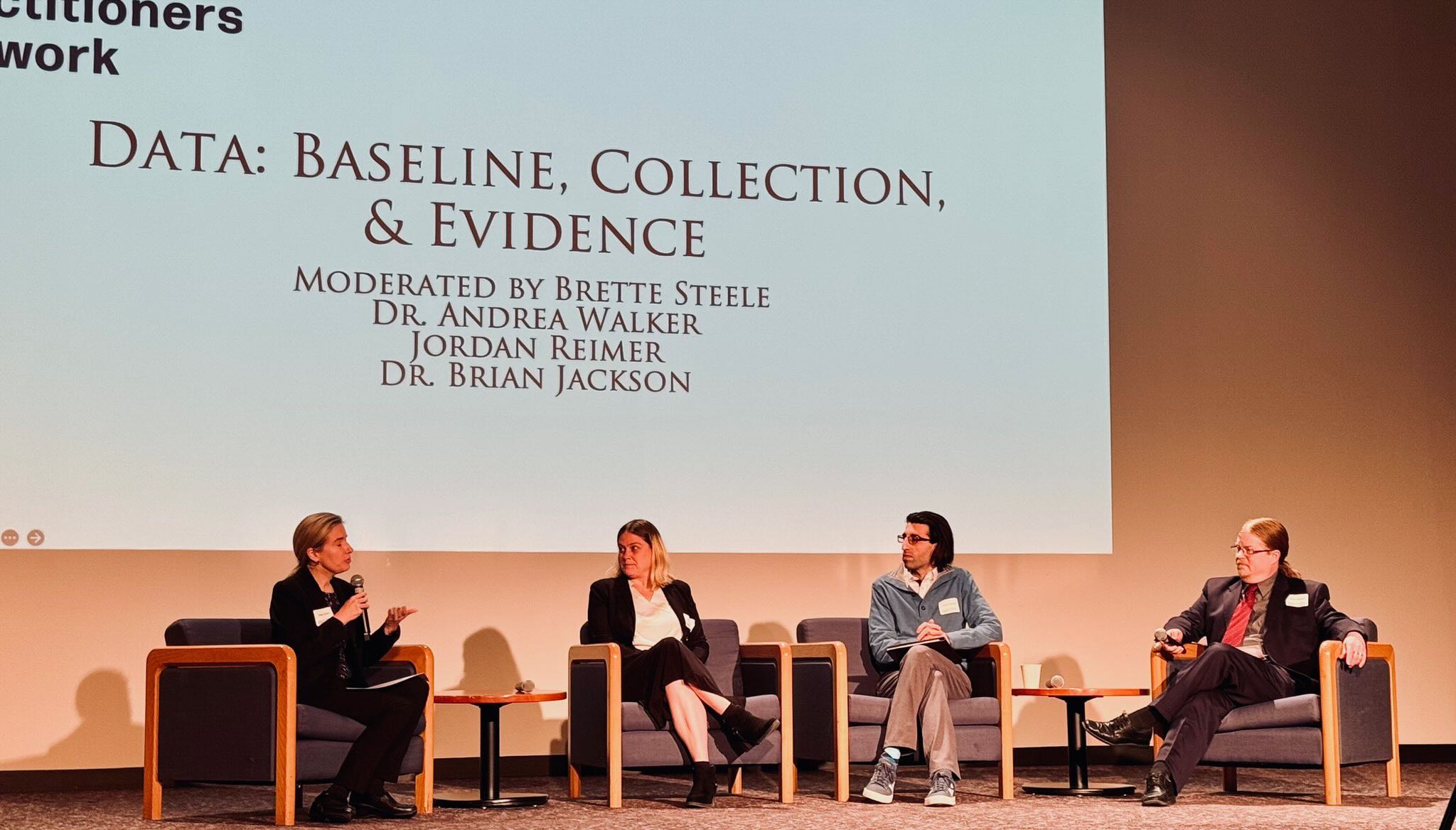Connection for Prevention: NCITE Researchers Travel East to Learn, Speak about Prevention Efforts
Several NCITE experts traveled east to attend three prevention-focused conferences in late January and early February. "There really is something to be said about being there in person and observing and interacting with people who are in this space doing this work," said NCITE's Andrea Walker.
- published: 2024/02/28
- contact: NCITE Communications
- email: ncite@unomaha.edu
- search keywords:
- terrorism
- targeted violence
- prevention

By Eva Burklund (NCITE Student Communications Assistant)
She got the email the night before she left.
Andrea Walker, Ph.D., NCITE research associate, was preparing to fly to Virginia for two consecutive conferences focusing on preventing extremist violence. As she read the email, she learned that she would not only be going to one of these conferences as a participant, but also as a panelist who would be talking about data collection.
“I just spent the day traveling and stressing,” Walker said. “It’s stressful because it’s such a last-minute thing, and it’s nerve-wracking because of the circumstances. But this is what we do. We collect data and evaluations.”
In late January and early February, Walker was one of five NCITE experts who flew east to attend conferences focused on prevention. The conferences included the National Threat Evaluation and Reporting Office’s (NTER) Master Trainer Summit, the Center for Prevention Programs and Partnerships (CP3) Targeted Violence and Terrorism Prevention (TVTP) Grantee Symposium, and the McCain Institute’s Prevention Practitioners Network Event: Evaluation and Metrics.
Walker attended both the Prevention Practitioners Network event, which brought attendees together to learn about data collection, and the CP3 symposium, which focused on bringing DHS grantees together to network.
She is a co-principal investigator on an NCITE project providing recommendations to NTER to enhance the outcomes of the Master Trainer program, which prepares participants to educate members of their communities on behavioral threat assessment best practices. Additionally, Walker works on another NCITE project, which is evaluating CP3’s Targeted Violence and Terrorism Prevention (TVTP) Grant Program, offered to state, local, tribal, and territorial (SLTT) governments, nonprofits, and institutions of higher education to help protect communities.
“I’m a qualitative researcher,” Walker said. “One of the best ways to find out what is working and what isn’t is to talk to the people who work in it … I can read something on a piece of paper, but just because something was written on a piece of paper three years ago doesn't mean that is actually what played out. That’s not the end. Talking to that person who lived that last three years is way more important.”
While data collection through surveys and virtual meetings can provide a good understanding of the TVTP projects and what they hope to accomplish, talking to grantees in person allows for a new perspective, she said.
“To be able to physically see and appreciate the passion that they have for their work is amazing, and you don’t get that same level of understanding if you’re just watching it virtually,” Walker said. “But there really is something to be said about being there in person and observing and interacting with people who are in this space doing this work. It’s the only way you’re really going to be able to understand them.”
Not long after, Tin Nguyen, Ph.D., NCITE senior research associate and co-principal investigator on the NTER project, attended the summit where NTER Master Trainers from across the country convened to share experiences. The program trains members of public safety agencies, such as law enforcement and public school employees, to recognize when they can intervene to prevent targeted violence. It also provides them with resources to educate others about threat assessment and management.
“In terms of communicating to others within their communities and empowering them to take some kind of action and to start up some of these behavioral threat assessment and management programs, Certified Master Trainers are really excited about the fact that the NTER office has given them course materials that they can use," Nguyen said. “So, I think they’re making it easier to spread the word about this type of work, which I think is really valuable.”
Anywhere along that pathway to violence, there are a bunch of different places where people can intervene.
During the summit, several people discussed success stories in prevention, including times when school shootings and other harmful events were prevented before a potential attacker mobilized to violence.
“Anywhere along that pathway to violence, there are a bunch of different places where people can intervene,” Nguyen said. “And I think it was just a good reminder that mental health and law enforcement and administrative folks of all kinds contribute really meaningfully to protecting … public and private spaces.”
While at these conferences, NCITE experts also had the opportunity to talk about how they are bolstering prevention efforts through understanding threats, understanding risk and protective factors for individuals, evaluating current prevention programs, and making these prevention programs scalable and sustainable.
“Once we learn what works about prevention, how do we help make those programs, like the people we got to meet at NTER, sustainable and scalable across their states?” Gina Ligon, Ph.D. NCITE director, said. “I feel like NCITE is in a great position to do that.”
Ligon said part of the way NCITE can further support prevention efforts is by attending events like these to connect with others who have similar goals – even if they’re half a country away.
“I’m always so proud of our team when we’re forward-facing,” Ligon said. “Just to see how people are so hungry for the knowledge that we’re producing at NCITE and excited that we’re there to support them makes me feel like we’re doing the right thing.”